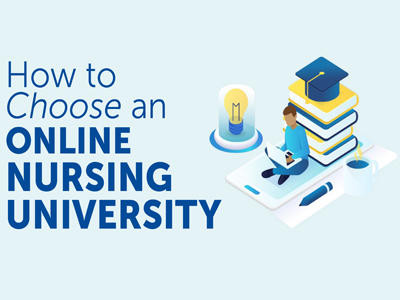Featured
Tags
Share

When considering an online nursing university, you may feel excited, but also anxious. Will you have the support you need to be successful? Will you feel connected to your classmates and your faculty in an online environment? Can you handle the technology? How will you fit in your education with work and family?
These fears are normal and expected. Choosing your online nursing school is one of the most important decisions you will make – and when you’re making a significant investment of time and money, you want to ensure it pays off. A high-quality program will empower you to be an extraordinary nurse – ready, prepared and confident in your practice.
As you consider online nursing schools, here are 11 key questions you should be asking:
1. Is the college or university accredited?
You may be asking yourself: what is accreditation, and why does it matter? Accreditation signals quality, and provides you with assurance that the program you’re considering meets the high standards expected by the government, employers and other colleges and universities.
Accreditation is so important for a number of reasons – it can impact your ability to get federal financial aid, transfer to another school or be accepted into a graduate program. Attending a program that lacks accreditation can even lead to issues getting licensed or limit your career options. Quality matters, so do your homework: learn what to look for here.
2. What type of support is available to online students?
When you’re in a brick-and-mortar nursing program, your instructor is at the front of the class, and you can walk to get tech support if you need it. As you consider your online nursing program options, you want to ensure that you have that same level of access and availability to support.
Often, the admissions process can be a great window into how schools support their students – how does the admissions team make you feel? Are they easing the process, by helping you get transcripts, for instance? Are they available and responsive? Other support-related questions to ask as you consider online nursing programs include:
- Technical: Always expect the unexpected – especially when it’s 11 pm, and you have an assignment due at 11:59 pm. Does the online nursing program have 24/7 technical support available?
- Faculty and Academic Support: How do you communicate with faculty members, and when are they available? If you need extra support in a subject, what resources are available to help you?
- Advising: Will you have a contact that can support you in your academic and career goals? Maybe you have a question about financial aid, or you had a change in heart about what specialty to pursue – will you have the support you need?
- Belief in Your Success: This may seem simple – but does your online nursing school weed people out, or give them everything they need to succeed? When students aren’t successful in nursing school, it’s often not a reflection of their ability, but how supported they are in their journey. Ensure the online nursing school you’re considering is able to ensure no one falls through the cracks, and provides the support needed when obstacles come up – because we all know, they likely will come up.
3. Will the online program give you the flexibility you need?
If you’re considering an online nursing education, you most likely need the flexibility that comes with it. You might have a job, a family that requires your care, mental and physical personal needs or simply want to save time on commuting.
You want to find the right program that allows space for your life, while also providing enough structure to get you to the finish line. Examples of questions you might want to ask could include:
- Are there certain times I need to be logged in, or are courses are on my time?
- Can I take more or less classes, depending on what is going on in my life outside of school?
- Are there any tools that can help me study on the go?
4. Does the online degree program accept transfer credits?
If you’ve taken credits toward a degree in the past, transferring them into a new program can help save you time and money.
Find out the rules behind transfer credits for your program of interest: how many credits can you transfer? What grade is needed? How old can the credits be? Some admissions teams will even do a transcript evaluation upfront as part of the application process so that you can see exactly what will transfer before you enroll. Don’t assume your credits will transfer – confirm this before you make your admissions decision.
5. What should I be thinking about in regards to cost?
It’s easy to get focused on just the cost of tuition – that's the big number, but there’s more to consider. Here’s a few:
- Total costs: Beyond tuition, what other costs will you incur? Textbooks, fees or supplies can all add up. Beyond direct costs, consider your life situation: will you have to reduce work hours or will you need to pay for childcare so you can focus on your online classwork? Is your computer a recent one or will you have to buy a new one? How is your internet connection?
- Financial support: Some institutions partner with healthcare institutions, nursing organizations and community colleges to offer you discounted tuition rates. Beyond this, financial assistance may be available in the form of grants, loans, work study or scholarships. Don’t take cost at sticker value – ask what the average student pays, as it may be lower and can give you a better picture of your true financial investment.
- Value: Don’t forget to think long-term, and remember the saying ‘you get what you pay for.’ While finding a low-cost school may seem like a priority, think of your education as an investment in yourself. If you were participating in a triathlon, you wouldn’t purchase the cheapest bike you could find at a local superstore for the competition. You would invest in a piece of equipment that you were confident could carry you to the end of the race.
Quality programs offer financial guidance and support to their graduates.
6. How are the online courses designed?
Have you ever heard that saying that it takes 10,000 hours to become an expert? Evaluate how long the university’s nursing program has been around, their reputation within the healthcare community and how long they’ve specifically offered online courses. Some schools have more than 20 years of online education – that’s 20 years to refine their curriculum, respond to student needs and gain the online learning expertise needed to support your success.
You can’t take a course taught in a classroom and throw it online, and not all online degree programs are created equally. Online nursing courses need to be thoughtfully and meticulously designed to foster an environment where you feel engaged with your learning and classmates – just reading documents or watching pre-recorded lectures isn’t going to cut it. Instructional designers dedicate their entire careers to ensure courses are well-designed. They organize learning resources in a way that ensures students know where to begin, what to do next and how they’re going to reach their goals in the course.
Quality Matters is one of the most highly regarded organizations in this field. They review online courses with the goal of designing them for effective learning – check if your institution’s courses have been reviewed and certified.
7. How well equipped are faculty for online teaching?
Along the same lines, a great faculty member in the classroom isn’t instantly a great instructor in an online environment. How does your program support the development of faculty for an online environment?
Many schools will provide digital tools to their faculty, but great online nursing schools also train their educators on how to be effective and engaging while using those tools. By providing this type of training, the institution is committing to a successful online experience for its students.
8. Is there a process to ensure you learn well?
Just as it’s important for educators to know how to teach online, it’s also important for students to be prepared for learning. Imagine giving two people a baseball mitt and a ball so that they can play catch. If you’re teaching them the game, you can’t just teach one person to throw the ball. You have to teach the other person how to receive and catch the ball well.
Great institutions provide courses, methods and frameworks that help you LEARN how to learn. It helps ensure students get the most out of their educational investment.
9. Is there an opportunity to engage with other students?
Online nursing education provides an amazing opportunity to connect with nurses at different levels, in different geographic areas and in different specialties – allowing you to learn from their perspectives and challenges. And they can also provide a great support system – nurses are in it together. The best online nursing schools keep you connected with other students through:
- Intention: Online learning institutions that understand the importance of community often build interactions into their curriculum. This provides a structured way to learn from your peers.
- Class Size: The right class size is key in engaging with your educators but also with your fellow students. Any class that goes beyond 1/25 could lead to a situation where you feel like just a number.
- Technology: Having the right platform for interaction and the right digital tools is important for fostering community across the internet.
10. Does the college help prepare you for licensure and certification exams?
The investment in your education won’t mean much if you can’t pass the licensure and certification exams to begin your practice. Set yourself up for success from the start, by asking the institutions you’re considering questions like:
- When does this school begin preparing students for their examination?
- Is this preparation incorporated into the curriculum?
- What are your students’ pass rates?
- What resources are provided to ensure success?
11. Will the online degree program help you towards your career goals?
Ultimately, you want your education to set you up for success in your career. there are some key questions you can ask yourself (and the institutions you’re considering) to help you outline the best degree program for yourself:
- Based on current data, will this degree provide me opportunities to achieve my desired income?
- Does the school offer career service support in finding a position? How big is my school’s network of alumni, partners and students?
- Will I be ready to work as soon as I finish my degree?
- How much job security can I expect with this type of degree?
- How much independence/flexibility could I expect in my future roles?
- Will the people teaching me have actual career experience I can lean on?
Ready to take the next step?
Finding the right online nursing university can be challenging. Our team at Chamberlain would love the opportunity to chat with you and assist you in your evaluation process. We believe in building great healthcare institutions by building great healthcare providers. Request more information, give us a call or begin your application process today. We’re ready to build an amazing future with you.
By Michael Britt
More from Careers
Request More Information
To receive the Chamberlain University Program Guide, including associated career paths, please select a program of study.






